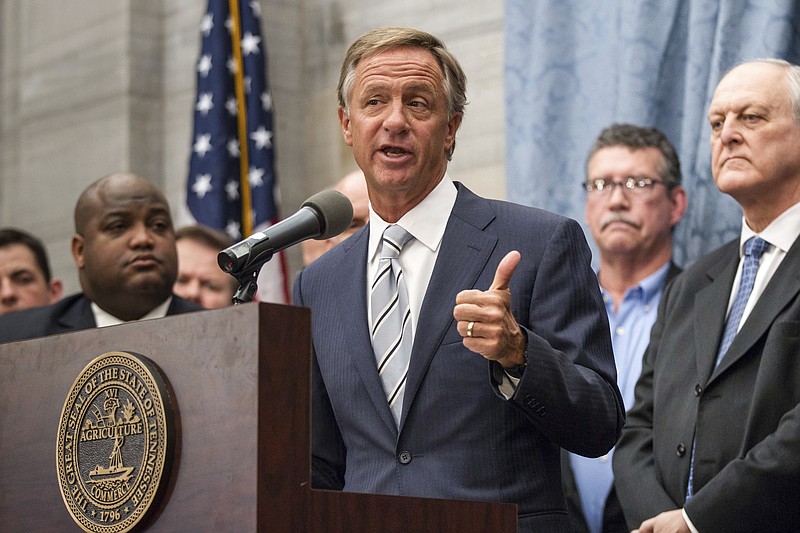NASHVILLE - Gov. Bill Haslam is applauding the U.S. Supreme Court's decision to take up a South Dakota case expected to determine whether Tennessee and other states can begin compelling out-of-state internet vendors to start collecting billions of dollars in sales taxes owed to them.
The Republican governor "is encouraged that the Supreme Court has agreed to hear this case and looks forward to the court's decision," said Haslam press secretary Jennifer Donnals.
"He believes it is unfair to disadvantage brick and mortar retailers in Tennessee against out-of-state, online retailers," Donnals added in the statement to the Times Free Press.
Last week, the nation's highest court agreed to revisit its 26-year-old ruling in a South Dakota case that eventually helped turn most internet commerce into a tax-free zone.
Tennessee Attorney General Herbert Slatery joined with Republican and Democratic colleagues from 33 states, including Alabama Attorney General Steve Marshall, in filing a friend-of-the-court brief in support of getting the Supreme Court to revisit the 1992 ruling known as Quill.
"We are pleased the Supreme Court has granted the petition and we will continue to support South Dakota's efforts," said Slatery spokesman Harlow B. Sumerford. "As we have stated previously, our hope is that the Court will level the playing field for the brick and mortar businesses in Tennessee."
Quill held that states could not compel catalog companies and similar out-of-state firms to collect sales taxes if their operations had no actual physical presence in a state such as a store.
Because it involves interstate commerce, that's the purview of the federal government, justices said at the time. Since then, internet commerce has not only come into existence but exploded, putting many traditional brick-and-mortar retailers back on their heels.
According to the Government Accountability Office, internet commerce in 2017 was estimated to cost 45 states, as well as local governments, between $8.5 billion and $13.4 billion in lost sales tax revenue.
While the Supreme Court said in Quill that it was up to Congress to address the issue, proposed legislation over the years never made it all the way into law. But emboldened by remarks two years ago by U.S. Supreme Court Justice Anthony Kennedy that it might be time to revisit Quill, states like South Dakota and Tennessee began passing laws or acting through administrative proceedings.
It was all aimed at getting the issue back before the Supreme Court. Here in Tennessee, Haslam's Revenue Department issued a rule in 2016 to begin collecting sales taxes. Associations for online retailers and catalog companies last year filed a legal challenge in Davidson County Chancery Court to Tennessee's rule.
Spokespeople for Lt. Gov. Randy McNally, R-Oak Ridge, the Senate speaker, and House Speaker Beth Harwell, R-Nashville, did not respond to requests for comment.
State Senate Finance Committee Chairman Bo Watson, R-Hixson, said Tennessee is a "sales tax-based state. And the sales tax on products that are purchased online have long been due. There's just a question of who collects them."
He noted that Tennessee and also the National Conference of State Legislatures "have all said this tax is due and should be paid. It's just a question of how we collect it."
When the nation's largest internet retailer, Amazon, expanded its existing fulfillment centers beyond Chattanooga and Cleveland to Middle Tennessee, Watson pointed out, "part of that agreement was that they would be sure that folks who paid through their platform, that the state collected the sales tax that is due."
"It's not a new law, it's not a new tax, it's on the books now and due now. It's just a method of how you collect it. I think it's good because of technology that the Supreme Court is taking another look."
Watson said he remains disappointed that Congress "has been unwilling to take action of importance to most states."
He said local brick-and-mortar retailers are often fixtures of their communities, supporting everything from school baseball teams to schools themselves.
"They support nonprofit activity in their communities. They reside in the area. A lot of the online providers, they don't participate," Watson added.
In 2013, the U.S. Senate did pass a bill championed by Republican U.S. Sen. Lamar Alexander, a former Tennessee governor, to require web retailers with sales above $1 million to collect sales taxes for states. It went nowhere in the U.S. House.
The Haslam administration in 2016 estimated Tennessee was losing out on an estimated $450 million in sales tax revenue due to online and similar out-of-state sales to Tennesseans.
If states win a favorable decision, both Watson and House Finance Subcommittee Chairman Gerald McCormick, R-Chattanooga, said they would favor Tennessee look at cutting its sales tax, one of the nation's highest.
While he can't speak for what a future General Assembly might do, current lawmakers' attitude would be to make it tax neutral, Watson said.
"[Y]ou would see us reducing the current sales tax."
The state currently levies a 7 percent sales tax on purchases of many goods. Last year the GOP-run Legislature insisted on cutting the sales tax on food sold in grocery stores from 5 percent to 4 percent in order for Haslam to get his IMPROVE Act for new road funding through.
"Hopefully," McCormick said, "depending on how much money came in, we'd be able to adjust the sales tax down."
Contact Andy Sher at asher@timesfreepress.com or 615-255-0550. Follow him on Twitter @AndySher1.
